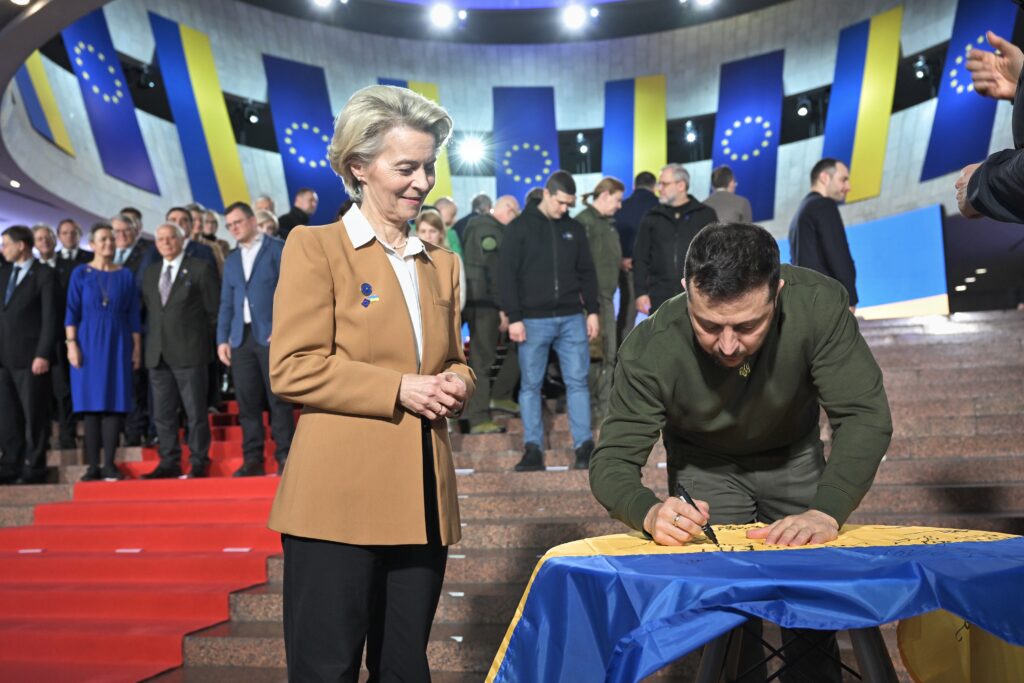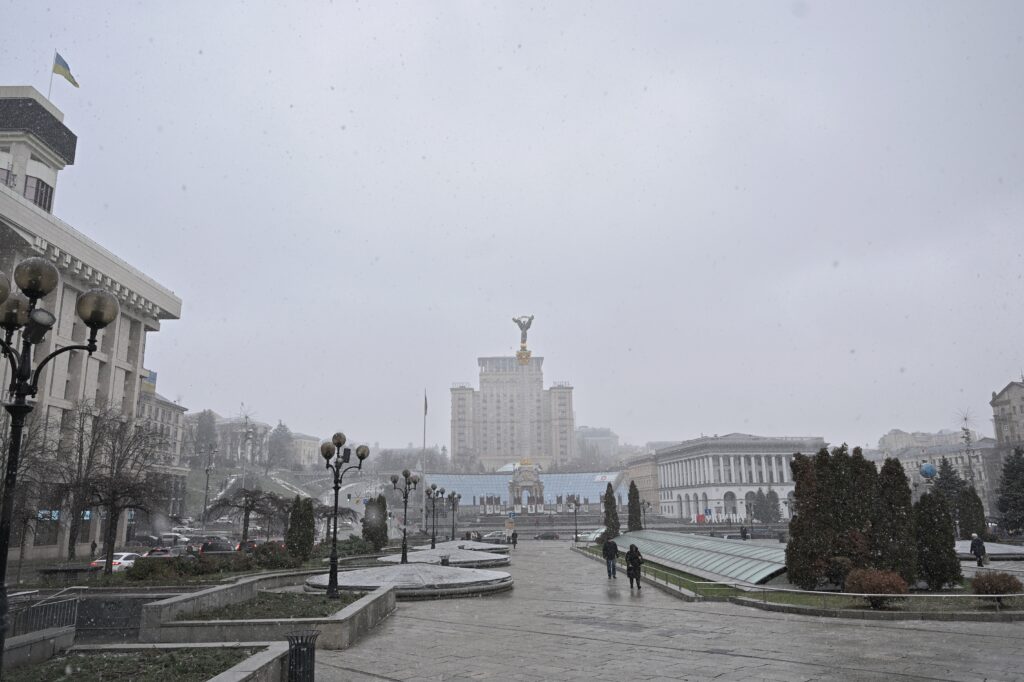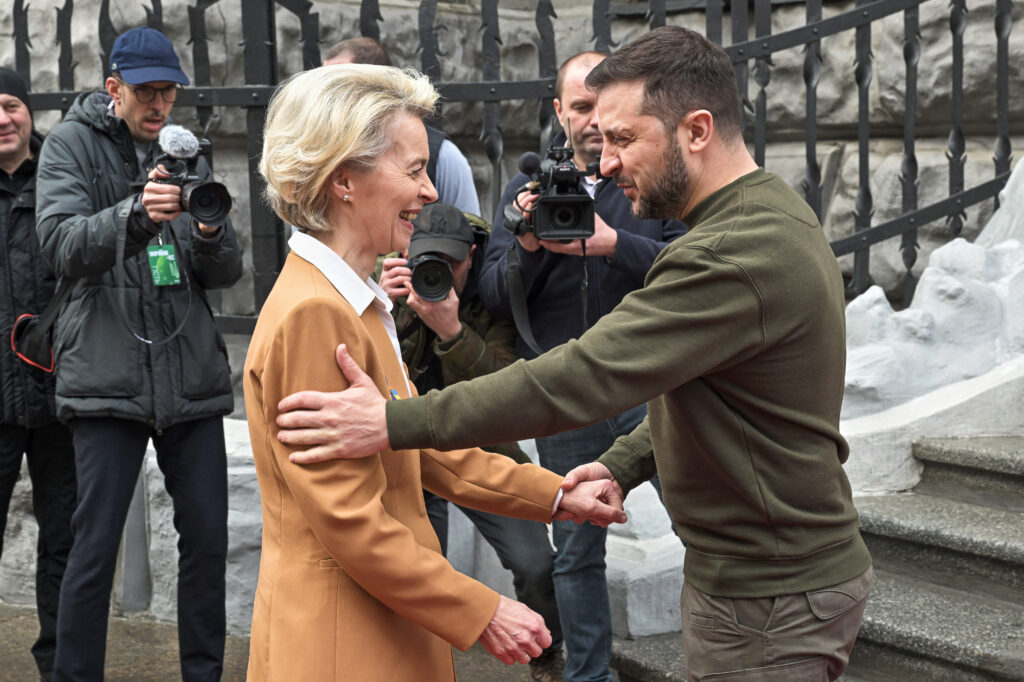
Blog: Will Ukraine really lose part of its sovereignty if it joins the EU?
Still today, I occasionally hear among some of my friends a certain scepticism about Ukrainian integration into the European Union (EU). It’s worth noting that these friends are well-educated, intelligent and have a critical-thinking approach. Their doubts are mainly based on the idea that Ukraine is going to lose its sovereignty if it becomes an EU Member State. I believe that we must strike down this myth once and for all.
The notion that Ukraine would lose its sovereignty if it were to join the European Union is a commonly held misperception. Membership of the EU would not result in a loss of independence for Ukraine, but rather offer numerous benefits that could enhance its sovereignty and stability.
Let’s have a look at how the Declaration on the State Sovereignty of Ukraine, enacted in 1990, defines sovereignty. According to the Declaration, the following 6 signs of state sovereignty can be distinguished:
- the principle of supremacy (in other words: the prerogative of power);
- the principle of independence;
- the principle of completeness (in other words: universality);
- the principle of the indivisibility of state power within its territory;
- the principle of independence in foreign relations;
- the principle of equality in foreign relations.
Step by step, I suggest analysing every aspect of sovereignty addressed by the Declaration and the potential risk of loss if Ukraine joins the EU.

- Supremacy
The principle of the prerogative of power is closely related to the absence of another higher social power on the territory of the country: the state power can cancel, or declare invalid any manifestation of any other public power. Indeed, the principle of supremacy and the powers of EU institutions are not in conflict because EU institutions are not considered to be in opposition to state power. Instead, they are seen as complementary to it. EU institutions are created by the member states of the EU through treaties and have the power to make laws that are binding on all member states. The principle of supremacy ensures that these laws take precedence over conflicting national laws, but it does not diminish the power of the state. Instead, it ensures that the powers of the EU and the member states are exercised in a complementary manner, with the EU institutions exercising their powers in areas where the EU has competence, and the national authorities retaining their powers in areas where they have jurisdiction. In this way, the principle of supremacy helps to ensure the proper functioning of the EU as a whole and its ability to achieve its goals.
- Independence
The idea of independence is mainly built on the ability to independently make decisions within the country and abroad in compliance with the norms of national and international law. There are reasons to believe that this principle is not in conflict with EU law, because EU law does not take away the independence of member states, but rather provides a framework for cooperation and coordination between them. EU law only applies in areas where the EU has been granted competence by the member states, and the EU institutions only have the powers that have been delegated to them by the member states. In this way, EU law enhances the independence of member states by allowing them to work together to achieve common goals and tackle common challenges, while still retaining their individual sovereignty and independence.
It is true that joining the EU would require Ukraine to adopt a range of EU policies and regulations, including those related to human rights, trade, and the environment. However, this process is not a one-way street, as Ukraine would also have a say in the development of these policies and regulations.
- Universality
The principle of completeness refers to the idea that a state’s power should extend to all spheres of state life, including its entire population and public organisations. This principle is respected by EU law, which recognises the sovereignty of member states to extend their state power within their own territory. However, in certain areas where the EU has competence, EU law may limit the ability of member states to extend their state power. Notably, EU law does not undermine the principle of completeness, but rather provides a framework for cooperation and coordination in areas where the EU has competence. In this way, the principle of completeness and compliance with EU law are not in conflict, but rather complement each other to enhance the ability of member states to achieve their goals and tackle common challenges.
- Indivisibility of state power within its territory
The principle of the indivisibility of state power refers to the idea that within a given territory, power is unified and cannot be divided or separated into different branches. However, this principle does not prevent the delegation of certain powers to other bodies, such as EU institutions, if the ultimate authority remains with the state. EU institutions are created by the member states and are given specific powers and responsibilities by the member states through treaties. The EU institutions, therefore, do not divide the power of the state, but rather complement it by exercising powers that have been delegated to them. The state remains the ultimate source of power and retains the authority to make decisions and take actions within its territory. The EU institutions, in turn, exercise their powers in areas where the EU has competence, such as trade, the environment, and justice and home affairs.
Let me provide you with an interesting fact: during the COVID-19 pandemic, EU institutions were criticised by EU citizens for not acting decisively enough. But EU institutions have neither exclusive nor shared competencies in the sphere of protection and improvement of human health. The only thing that they could do was to support national bodies in that sphere.

- Independence in foreign relations
The principle of independence in foreign relations and compliance with EU norms are not in conflict because EU law recognises the independence of member states in their foreign relations. The principle of independence in foreign relations refers to a state’s ability to make its own decisions and conduct its own foreign policy without interference from other states. This principle is respected by EU law, which recognises that the foreign policy of each member state is the responsibility of that state and that the EU institutions do not have the power to dictate or interfere in the foreign policy of member states.
However, in certain areas where the EU has competence, such as trade and development policy, the EU institutions may make decisions and take actions that are binding on all member states. In these areas, membership of the EU would provide Ukraine with greater access to the world’s largest single market and to a wealth of resources and expertise. This would help to boost the country’s economy and support its development, potentially enhancing its overall independence and security.
- Equality in foreign relations
The principle of equality in foreign relations refers to the idea that all states have the same rights and obligations in their dealings with other states and in the international community. This principle is respected by EU law, which recognises that all member states have equal status and are equal partners in the EU. EU law does not give any member state greater rights or obligations than any other member state, and EU institutions are required to act in a way that is consistent with the principle of equality.
In conclusion, the notion that Ukraine would lose its sovereignty if it were to join the EU is a fallacy. Membership in the EU would provide Ukraine with numerous benefits, including increased stability, prosperity, and access to resources and expertise. By working together with its EU partners, Ukraine would have a greater ability to shape its own future and exert its independence on the world stage. It is worth noting that Ukraine already has a close relationship with the EU, with many of its citizens enjoying the benefits of visa-free travel and increased trade and investment. Joining the EU would take this relationship to the next level, providing Ukraine with a greater voice on the international stage and access to the EU’s collective resources and influence.

LATEST

How you can help the planet every day

Building Europe: Poland’s experience of joining the European Union and lessons for Ukraine

World Health Day 2024: My Health, My Right

EUREKA MEETS EUROPE – opportunities to develop and study. My experience

Can you wear pink in the workplace?
More campaign pages:
Interested in the latest news and opportunities?
This website is managed by the EU-funded Regional Communication Programme for the Eastern Neighbourhood ('EU NEIGHBOURS east’), which complements and supports the communication of the Delegations of the European Union in the Eastern partner countries, and works under the guidance of the European Commission’s Directorate-General for Neighbourhood Policy and Enlargement Negotiations, and the European External Action Service. EU NEIGHBOURS east is implemented by a GOPA PACE-led consortium. It is part of the larger Neighbourhood Communication Programme (2020-2024) for the EU's Eastern and Southern Neighbourhood, which also includes 'EU NEIGHBOURS south’ project that runs the EU Neighbours portal.

The information on this site is subject to a Disclaimer and Protection of personal data. © European Union,